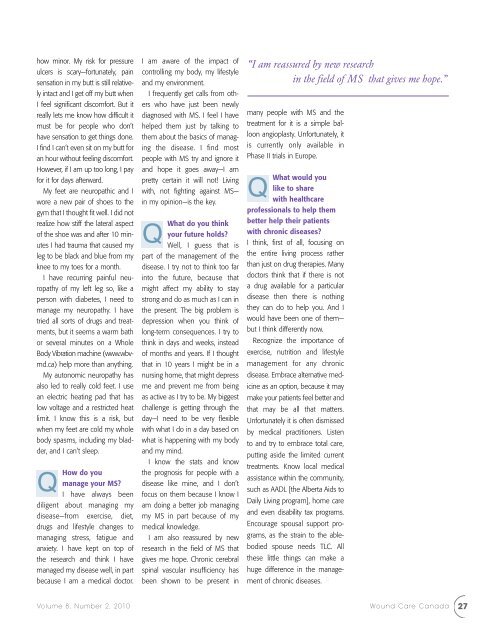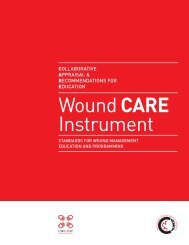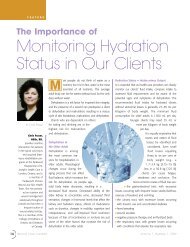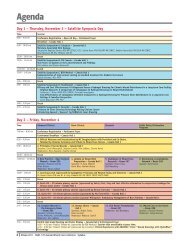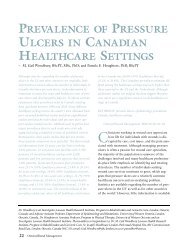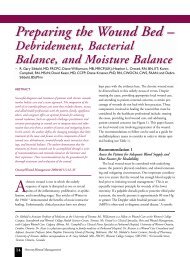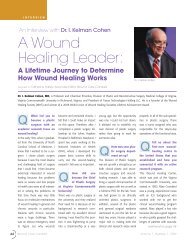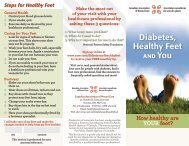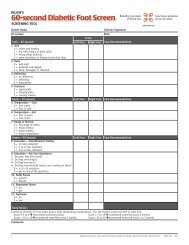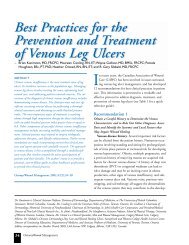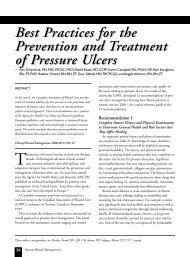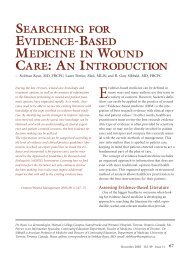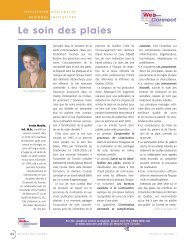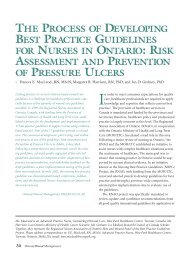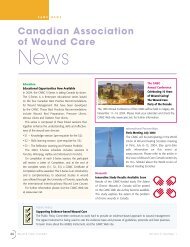Bilateral Lower Limb Lymphedema Secondary to Morbid Obesity
Bilateral Lower Limb Lymphedema Secondary to Morbid Obesity
Bilateral Lower Limb Lymphedema Secondary to Morbid Obesity
Create successful ePaper yourself
Turn your PDF publications into a flip-book with our unique Google optimized e-Paper software.
how minor. My risk for pressure<br />
ulcers is scary—fortunately, pain<br />
sensation in my butt is still relatively<br />
intact and I get off my butt when<br />
I feel significant discomfort. But it<br />
really lets me know how difficult it<br />
must be for people who don’t<br />
have sensation <strong>to</strong> get things done.<br />
I find I can’t even sit on my butt for<br />
an hour without feeling discomfort.<br />
However, if I am up <strong>to</strong>o long, I pay<br />
for it for days afterward.<br />
My feet are neuropathic and I<br />
wore a new pair of shoes <strong>to</strong> the<br />
gym that I thought fit well. I did not<br />
realize how stiff the lateral aspect<br />
of the shoe was and after 10 minutes<br />
I had trauma that caused my<br />
leg <strong>to</strong> be black and blue from my<br />
knee <strong>to</strong> my <strong>to</strong>es for a month.<br />
I have recurring painful neuropathy<br />
of my left leg so, like a<br />
person with diabetes, I need <strong>to</strong><br />
manage my neuropathy. I have<br />
tried all sorts of drugs and treatments,<br />
but it seems a warm bath<br />
or several minutes on a Whole<br />
Body Vibration machine (www.wbvmd.ca)<br />
help more than anything.<br />
My au<strong>to</strong>nomic neuropathy has<br />
also led <strong>to</strong> really cold feet. I use<br />
an electric heating pad that has<br />
low voltage and a restricted heat<br />
limit. I know this is a risk, but<br />
when my feet are cold my whole<br />
body spasms, including my bladder,<br />
and I can’t sleep.<br />
Q<br />
How do you<br />
manage your MS?<br />
I have always been<br />
diligent about managing my<br />
disease—from exercise, diet,<br />
drugs and lifestyle changes <strong>to</strong><br />
managing stress, fatigue and<br />
anxiety. I have kept on <strong>to</strong>p of<br />
the research and think I have<br />
managed my disease well, in part<br />
because I am a medical doc<strong>to</strong>r.<br />
I am aware of the impact of<br />
controlling my body, my lifestyle<br />
and my environment.<br />
I frequently get calls from others<br />
who have just been newly<br />
diagnosed with MS. I feel I have<br />
helped them just by talking <strong>to</strong><br />
them about the basics of managing<br />
the disease. I find most<br />
people with MS try and ignore it<br />
and hope it goes away—I am<br />
pretty certain it will not! Living<br />
with, not fighting against MS—<br />
in my opinion—is the key.<br />
Q<br />
What do you think<br />
your future holds?<br />
Well, I guess that is<br />
part of the management of the<br />
disease. I try not <strong>to</strong> think <strong>to</strong>o far<br />
in<strong>to</strong> the future, because that<br />
might affect my ability <strong>to</strong> stay<br />
strong and do as much as I can in<br />
the present. The big problem is<br />
depression when you think of<br />
long-term consequences. I try <strong>to</strong><br />
think in days and weeks, instead<br />
of months and years. If I thought<br />
that in 10 years I might be in a<br />
nursing home, that might depress<br />
me and prevent me from being<br />
as active as I try <strong>to</strong> be. My biggest<br />
challenge is getting through the<br />
day—I need <strong>to</strong> be very flexible<br />
with what I do in a day based on<br />
what is happening with my body<br />
and my mind.<br />
I know the stats and know<br />
the prognosis for people with a<br />
disease like mine, and I don’t<br />
focus on them because I know I<br />
am doing a better job managing<br />
my MS in part because of my<br />
medical knowledge.<br />
I am also reassured by new<br />
research in the field of MS that<br />
gives me hope. Chronic cerebral<br />
spinal vascular insufficiency has<br />
been shown <strong>to</strong> be present in<br />
“I am reassured by new research<br />
in the field of MS that gives me hope.”<br />
many people with MS and the<br />
treatment for it is a simple balloon<br />
angioplasty. Unfortunately, it<br />
is currently only available in<br />
Phase II trials in Europe.<br />
Q<br />
What would you<br />
like <strong>to</strong> share<br />
with healthcare<br />
professionals <strong>to</strong> help them<br />
better help their patients<br />
with chronic diseases?<br />
I think, first of all, focusing on<br />
the entire living process rather<br />
than just on drug therapies. Many<br />
doc<strong>to</strong>rs think that if there is not<br />
a drug available for a particular<br />
disease then there is nothing<br />
they can do <strong>to</strong> help you. And I<br />
would have been one of them—<br />
but I think differently now.<br />
Recognize the importance of<br />
exercise, nutrition and lifestyle<br />
management for any chronic<br />
disease. Embrace alternative medicine<br />
as an option, because it may<br />
make your patients feel better and<br />
that may be all that matters.<br />
Unfortunately it is often dismissed<br />
by medical practitioners. Listen<br />
<strong>to</strong> and try <strong>to</strong> embrace <strong>to</strong>tal care,<br />
putting aside the limited current<br />
treatments. Know local medical<br />
assistance within the community,<br />
such as AADL [the Alberta Aids <strong>to</strong><br />
Daily Living program], home care<br />
and even disability tax programs.<br />
Encourage spousal support programs,<br />
as the strain <strong>to</strong> the ablebodied<br />
spouse needs TLC. All<br />
these little things can make a<br />
huge difference in the management<br />
of chronic diseases.<br />
Volume 8, Number 2, 2010 Wo u n d C a re C a n a d a 27


